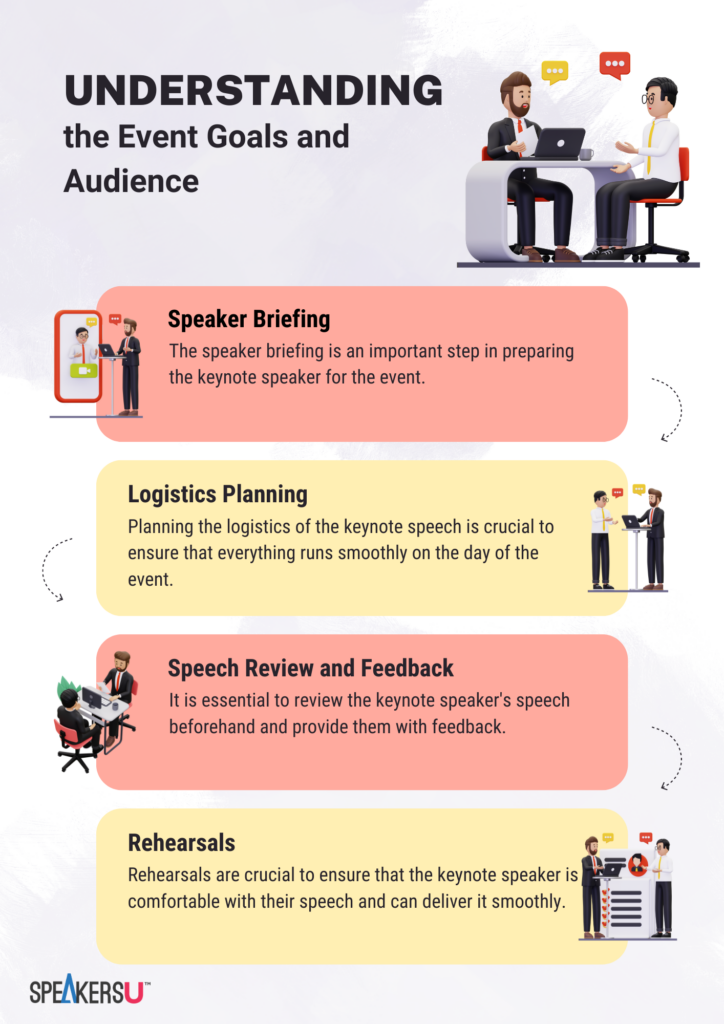Keynote Speaker Pre-Event Checklist
As an organizer of a corporate meeting or conference, you want your event to run smoothly and be a success. One of the most important aspects of any event is the keynote speaker. They set the tone for the event and can make or break its success. Therefore, it is crucial to ensure that the keynote speaker is well-prepared and everything is in order before they take the stage. In this article, we will provide a comprehensive guide to help you create a pre-event checklist for your keynote speaker.
Introduction to the importance of a pre-event checklist for keynote speakers, and why it is important for organizers to ensure everything is in order before the speaker takes the stage.
The first step to preparing a keynote speaker for an event is to understand the event goals and the audience. It is important to identify the purpose of the event and the key messages that need to be conveyed to the audience. This helps the keynote speaker to tailor their speech to the audience and achieve the desired outcome.

The speaker briefing is an important step in preparing the keynote speaker for the event. This is where you provide the speaker with all the necessary information about the event, including the agenda, the theme, the audience demographics, and the time allotted for the speech. You should also provide them with any supporting materials such as videos, slides, or handouts.
Planning the logistics of the keynote speech is crucial to ensure that everything runs smoothly on the day of the event. This includes ensuring that the speaker arrives on time, has a place to stay, and is familiar with the venue. You should also make sure that the speaker has all the necessary equipment and that it is working properly, such as microphones, projectors, and sound systems.
It is essential to review the keynote speaker’s speech beforehand and provide them with feedback. This ensures that their speech is in line with the event goals and that they deliver the intended message to the audience. You should also make sure that the speech is not too long or too short and that it flows smoothly.
Rehearsals are crucial to ensure that the keynote speaker is comfortable with their speech and can deliver it smoothly. This includes rehearsals with the equipment and any other special requirements, such as a translator or a sign language interpreter.
On the day of the event, it is important to make sure that everything is in order for the keynote speaker. This includes ensuring that they have all the necessary materials and equipment, that they have a quiet space to prepare, and that they are familiar with the venue.
Despite careful planning, things can still go wrong on the day of the event. Therefore, it is essential to have backup plans in case of unforeseen circumstances. This includes having a backup microphone, projector, or sound system, and a contingency plan in case the keynote speaker is unable to attend.
The stage set-up is crucial to ensure that the keynote speaker can deliver their speech effectively. This includes the lighting, the sound system, and the background visuals. You should also make sure that the podium and microphone are at the appropriate height and that the speaker has a clear line of sight to the audience.
The introduction and closing remarks are an important part of the keynote speech. They set the stage for the speaker and provide a framework for the speech. It is important to ensure that the introduction and closing remarks It is important to ensure that the introduction and closing remarks are accurate and aligned with the speaker’s message. The introduction should provide a brief background on the speaker and their expertise, as well as highlight the key points of their speech. The closing remarks should summarize the key takeaways and encourage the audience to take action
After the event, it is important to follow up with the keynote speaker and provide feedback. This helps to build a good relationship with the speaker and ensure that they will be willing to participate in future events. You should also collect feedback from the audience and incorporate it into your planning for future events.
Sending a thank-you note to the keynote speaker is a good way to show appreciation for their participation in the event. You should also make sure that the speaker is paid promptly and that all expenses are reimbursed in a timely manner.
Evaluating the success of the event is crucial to ensure that it meets the event goals and objectives. This includes collecting feedback from the audience and analyzing the performance of the keynote speaker. You should also review the pre-event checklist and identify any areas that need improvement for future events.
In conclusion, a pre-event checklist for keynote speakers is essential for the success of any corporate meeting or conference. By following the steps outlined in this article, you can ensure that your keynote speaker is well-prepared and everything is in order before they take the stage. By providing the speaker with the necessary support and feedback, you can help them deliver a memorable and impactful speech that achieves the event goals.
Why is a pre-event checklist important for keynote speakers? A pre-event checklist helps to ensure that the keynote speaker is well-prepared and everything is in order before they take the stage. This helps to ensure the success of the event and the delivery of the intended message to the audience.
What should be included in a speaker briefing? A speaker briefing should include information about the event, the agenda, the theme, the audience demographics, and the time allotted for the speech. You should also provide any supporting materials such as videos, slides, or handouts.
How can I ensure that the keynote speaker’s speech is aligned with the event goals? You can review the keynote speaker’s speech beforehand and provide them with feedback. This helps to ensure that their speech is in line with the event goals and that they deliver the intended message to the audience.
What should be included in the introduction and closing remarks? The introduction should provide a brief background on the speaker and their expertise, as well as highlight the key points of their speech. The closing remarks should summarize the key takeaways and encourage the audience to take action.
Why is post-event evaluation important? Post-event evaluation helps to ensure that the event meets the event goals and objectives. This includes collecting feedback from the audience and analyzing the performance of the keynote speaker. It also helps to identify areas that need improvement for future events.

Coach

Executive Coach

Coach

SpeakersU.com is a keynote speaker review website that provides unbiased reviews and in-depth advice to help you find the best keynote speaker for your event.